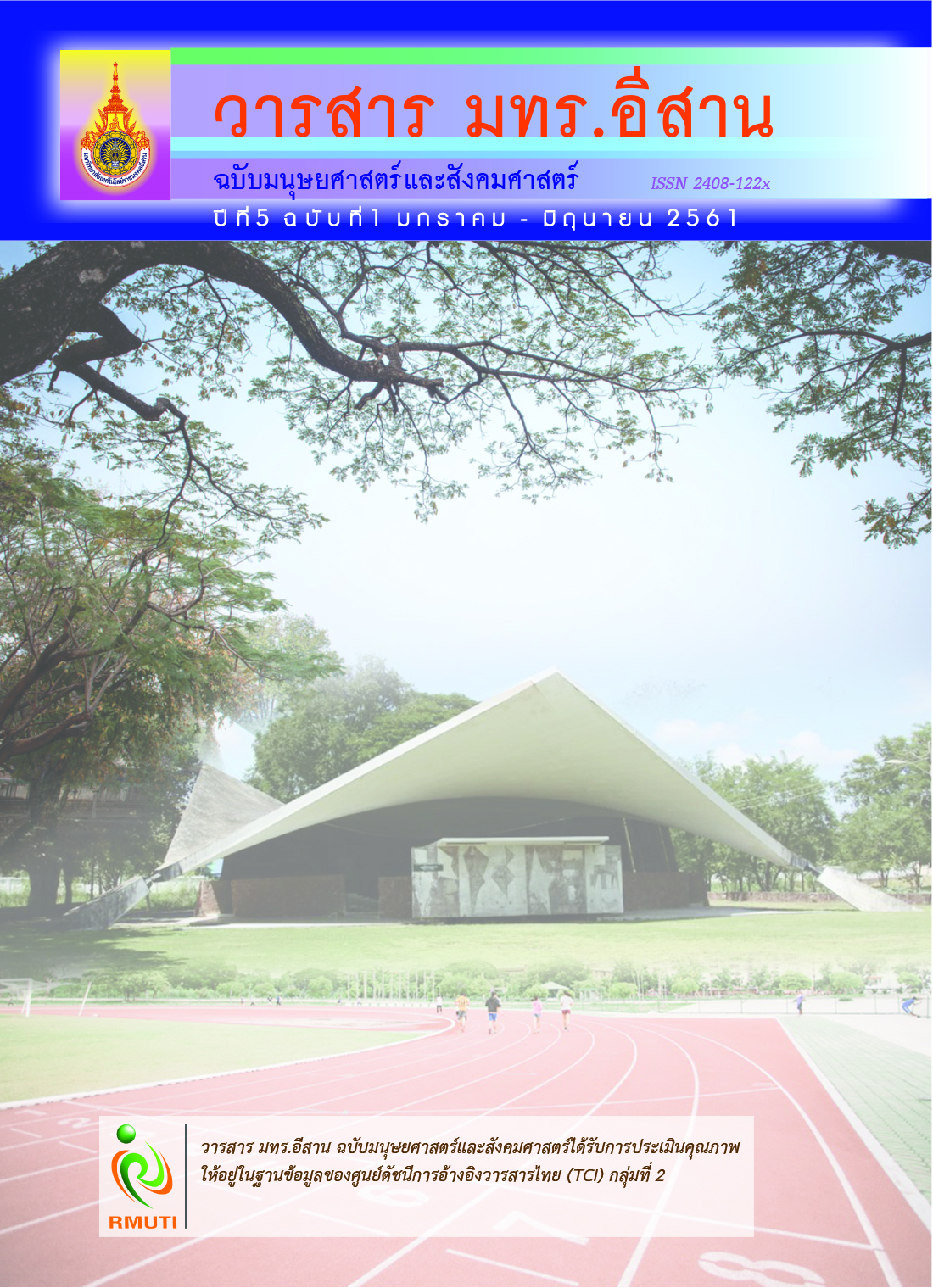Cultural Tourism in line with Local Sustainable Development: a Case Study of Khemarat District, Ubon Ratchathani Province
Main Article Content
Abstract
This article was studied the cultural tourism in line with local sustainable development: a case study of Khemarat District, Ubon Ratchathani Province. The purpose of this study are: 1) To study the eff ecting of tourism development, 2) To study the adaptation of people in the area where got infl uence by tourism development and 3) Analysis the recommendations to make Khemarat District, Ubon Ratchathani province a sustainable tourism area. Qualitative research methodology was utilized through the use of: focus group discussion, in-depth interviews and participatory observation. The 4 key informant groups are: 1) 10 permanent residents in the area 2) 10 random entrepreneurs, restaurant and resort operators in the area 3) 10 tourists, and 4) one academic, totaling 31 people. The study was conducted in 3 areas: Kaeng Chang Mob, Thanon Khon Dern and Had Sai Soong. The study indicated that: 1. The eff ecting of tourism development - People in the Khemarat district, in all three areas, provided comments in the same direction that they were experiencing no negative eff ecting after the tourism development. Where as, there were only positive eff ects to be found such as local people can get more income. This plausibly derived from exploitation of the raising cultural capital after tourism development, which led to preservation of natural resources, environment and local culture. 2. The adaptation of people in the area where infl uenced by tourism development - The study revealed that all people were found to be fl exible and ready for tourism development in the area. The people in the community were cautious, insusceptible to the impact of change and collaborative. The study further revealed people perceived that, by conforming to the government’s plan, there is a better chance of surviving in the rapidly changing society. 3. Recommendations to make Khemarat District be a sustainable tourism area - In order to strengthen the local, government agencies should play signifi cant role in encouraging people in the area to participate in knowledge management (KM), because it is the way to help local to manage cultural resources and preserve local wisdom. The recommendation for KM initiation in the area can be done through various medium includes: grouping, establishing clubs, collaborative networking, etc. In addition, government agencies should continuously help local promote tourism in all sectors.
Article Details
บทความที่ได้รับการตีพิมพ์เป็นลิขสิทธิ์ของมหาวิทยาลัยเทคโนโลยีราชมงคลอีสาน
ข้อความที่ปรากฏในบทความแต่ละเรื่องในวารสารวิชาการเล่มนี้เป็นความคิดเห็นส่วนตัวของผู้เขียนแต่ละท่านไม่เกี่ยวข้องกับมหาวิทยาลัยเทคโนโลยีราชมงคลอีสานและคณาจารย์ท่านอื่นๆในมหาวิทยาลัยฯ แต่อย่างใด ความรับผิดชอบองค์ประกอบทั้งหมดของบทความแต่ละเรื่องเป็นของผู้เขียนแต่ละท่าน หากมีความผิดพลาดใดๆ ผู้เขียนแต่ละท่านจะรับผิดชอบบทความของตนเองแต่ผู้เดียว
References
กาญจนา แสงลิ้มสุวรรณ และศรันยา แสงลิ้มสุวรรณ. (2559). การท่องเที่ยวเชิงมรดกวัฒนธรรมอย่างยั่งยืน. เข้าถึงเมื่อ (19 สิงหาคม 2559). เข้าถึงได้จาก (https://www.bu.ac.th/knowledgecenter/executive_journal/oct_dec_12/pdf/aw019.pdf)
จักรแก้ว นามเมือง. (2551). วัฒนธรรมไทย ทุนทางวัฒนธรรม. กรุงเทพฯ: มหาวิทยาลัยจุฬาลงกรณ์ราชวิทยาลัย
จันทร์คอน คำแสน, บุษบา สิทธิการ และสิริวัฒนา ใจมา. (2548). ผลกระทบของการท่องเที่ยวต่อสังคมและวัฒนธรรมของชุมชนการท่องเที่ยวในจังหวัดเชียงราย. เชียงราย: มหาวิทยาลัยแม่ฟ้าหลวง
จุฑามาศ ไชยศร. (2541). การท่องเที่ยวแห่งประเทศไทย. กรุงเทพฯ: มหาวิทยาลัยกรุงเทพ
จุฑารัตน์ เจือจิ้น. (2555). แนวทางการจัดการท่องเที่ยวทางวัฒนธรรม บ้านนํ้าเชี่ยว จังหวัดตราด. วิทยานิพนธ์ปริญญาศิลปศาสตรมหาบัณฑิต สาขาวิชาการจัดการทรัพยากรวัฒนธรรม มหาวิทยาลัยศิลปากร
ชมรมอีสานและภูมิภาคอินโดจีนศึกษา. (2555). ศิลปะวัฒนธรรมประเพณีอีสาน. พิษณุโลก: มหาวิทยาลัยนเรศวร
นิธิ เอียวศรีวงศ์. (2538). อุตสาหกรรมท่องเที่ยวกับผลกระทบต่อวัฒนธรรม. กรุงเทพฯ: สำนักพิมพ์มติชน
ประภัสสร โพธ์ิศรีทอง. (2556). โลกาภิวัตน์กับการจัดการวัฒนธรรมนักวิชาการด้านการจัดการวัฒนธรรม. กรุงเทพฯ: มหาวิทยาลัยมหิดล
ผ่องพันธ์ มณีรัตน์. (2521). การเปลี่ยนแปลงทางสังคมและวัฒนธรรม. กรุงเทพฯ: มหาวิทยาลัยธรรมศาสตร์
พวงทิพย์ เกิดทรัพย์, วรชัย วิริยารมย์, สิริกุล วิริยารมย์ และกฤตย มีทวี. (2550). วัฒนธรรมท้องถิ่นเพื่อการจัดตั้งพิพิธภัณฑ์ชุมชน บริเวณลุ่มแมน้ำปิง จังหวัดตาก. กรุงเทพฯ: มหาวิทยาลัยรามคำแหง
วรรณะ รัตนพงษ์ และอนัตต์ ลัคนหทัย. (2543). ประชาคมโลกภายใต้กระแสโลกาภิวัตน์. เข้าถึงเมื่อ (12 พฤษภาคม 2560). เข้าถึงได้จาก (https://www.baanjomyut.com/library/global_community/08.html)
วิชุกร กุหลาบศรี. (2556). การท่องเที่ยวแห่งประเทศไทย (ททท.สอบ). อุบลราชธานี: สำนักงานการท่องเที่ยวและกีฬา
ศรสวรรค์ เชยโนนสูง. (2554). การท่องเที่ยวในประเทศไทย. เข้าถึงเมื่อ (22 เมษายน 2560). เข้าถึงได้จาก (https://nookoii.blogspot.com/2011/02/blog-post_3191.html)
สัจจา ไกรศรรัตน์. (2556). แนวทางการใช้วัฒนธรรมท้องถิ่นจังหวัดราชบุรีเป็นฐานในการพัฒนาและส่งเสริมการท่องเที่ยว. ราชบุรี : มหาวิทยาลัยราชภัฏหมู่บ้านจอมบึง
สุพัตรา คงขำ. (2556). การพัฒนารูปแบบการจัดการความรู้ภูมิปัญญาพื้นบ้านหนังตะลุงเพื่อเสริมสร้างความเข้มแข็งทางวัฒนธรรมท้องถิ่น. วิทยานิพนธ์ปริญญาปรัชญาดุษฎีบัณฑิต สาขาวิชาพัฒนศึกษา มหาวิทยาลัยศิลปากร
สุภาพรรณ มะทะลา. (2555). วัฒนธรรมไทยสิ่งดีงามที่สร้างมาแต่โบราณ. เข้าถึงเมื่อ (18 กุมภาพันธ์ 2560). เข้าถึงได้จาก (https://suphaphan2535.wordpress.com)
อนุสรณ ์ ลิ่มมณี. (2542). รัฐ สังคม และการเปลี่ยนแปลง: การพิจารณาในเชิงอำนาจนโยบายและเครือข่ายความสัมพันธ์. กรุงเทพฯ: จุฬาลงกรณ์มหาวิทยาลัย
อภิชาติ ดำดี. (2552). กระบวนทัศน์ใหม่ในการพัฒนาท้องถิ่น. เข้าถึงเมื่อ (1 เมษายน 2560). เข้าถึงได้จาก (https://oknation.nationtv.tv/blog/damdee/2009/06/05/entry-1)


